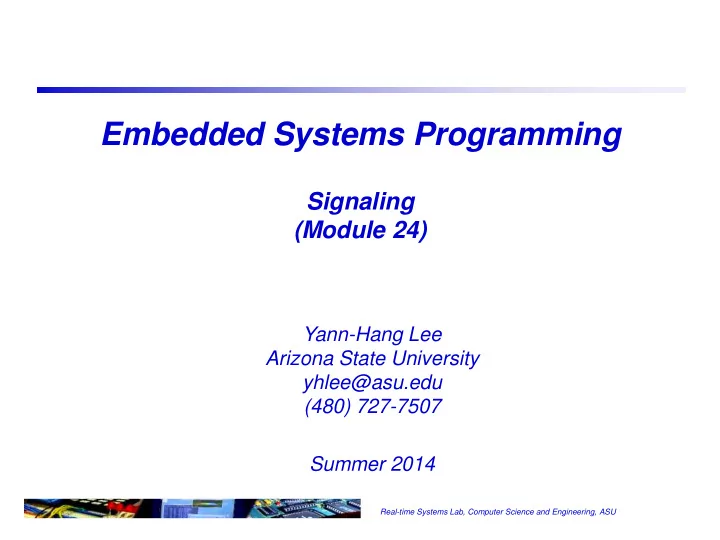

Embedded Systems Programming Signaling (Module 24) Yann-Hang Lee Arizona State University yhlee@asu.edu (480) 727-7507 Summer 2014 Real-time Systems Lab, Computer Science and Engineering, ASU
Signals A signal is an event generated by OS in response to some condition (from processes or IO). Upon receipt of a signal a process or thread may take some action. Signal generation: by error conditions or external events (memory segment violations, floating point processor errors, illegal instructions) by one process (thread) to another to send information Signals may be generated asynchronously to thread execution queued? argument? pending or blocked Real-time Systems Lab, Computer Science and Engineering, ASU 1
Signal Handler To register a handler -- signal (signo, sigHandler) void sigHandler ( int sig, int code, struct sigcontext * pSigCtx); Exception: OS issues a signal to the running task if no signal handler, suspend the task hardware dependent return with exit(), taskRestart(), longjump(), or return normal program sigHandler { { . . . . signal . . . . } } Who will run the signal handler Real-time Systems Lab, Computer Science and Engineering, ASU 2
Example #include <signal.h> /* signal name macros, and the signal() prototype */ sig_atomic_t sigusr1_count = 0; void handler (int signal_number) { ++sigusr1_count; } int main () { struct sigaction sa; memset (&sa, 0, sizeof (sa)); sa.sa_handler = &handler; sigaction (SIGUSR1, &sa, NULL); /* ... */ printf (“SIGUSR1 was raised %d times\n”, sigusr1_count); return 0; } Real-time Systems Lab, Computer Science and Engineering, ASU 3
Linux and POSIX Signals POSIX standard and real-time signals, and other signals Program Error Signals –SIGSEGV, SIGFPE, SIGILL, SIGABRT, etc. generated when a serious program error is detected Termination Signals – SIGHUP, SIGQUIT, SIGKILL, SIGTERM … to tell a process to terminate Alarm Signals – SIGALRM, … to indicate the expiration of timers. Asynchronous I/O Signals – SIGIO, SIGURG. Job Control Signals Miscellaneous Signals – SIGPIPE, SIGUSR1, SIGUSR2 If both standard and real-time signals are pending, POSIX leaves it unspecified which is delivered first. Linux gives priority to standard signals Real-time Systems Lab, Computer Science and Engineering, ASU 4
In User Mode Write a signal handler function, e .g. handle SIGINT void sigint_handler(int sig) { fprintf(stderr,”Interrupted!\n”); } Install it: struct sigaction new_action, old_action; new_action.sa_handler = sigint_handler; sigaction(SIGINT, &new_action, &old_action); Struct sigaction struct sigaction { void (*sa_handler)(int); void (*sa_sigaction)(int, siginfo_t *, void *); sigset_t sa_mask; int sa_flags; void (*sa_restorer)(void); } Real-time Systems Lab, Computer Science and Engineering, ASU 5
Some Issues on Signals When the handler will run after the signal is delivered Access variables in handler Handler may execute at any time Need to be careful of manipulating global state in signal handler Signal delivery may interrupt execution of handler – reentrant may make system calls Should block signals if this is not acceptable Only one signal handler per signal per process delivered to one thread (arbitrary one) Can’t use in library code In many implementations, no signal queuing Real-time Systems Lab, Computer Science and Engineering, ASU 6
Alarm System Call unsigned alarm(unsigned seconds); Requests the system to generate a SIGALRM for the process after seconds time have elapsed. If seconds is 0, a pending alarm request, if any, is canceled. Alarm requests are not stacked; only one SIGALRM generation can be scheduled in this manner. If the SIGALRM signal has not yet been generated, the call shall result in rescheduling the time at which the SIGALRM signal is generated. Processor scheduling delays may prevent the process from handling the signal as soon as it is generated. Real-time Systems Lab, Computer Science and Engineering, ASU 7
Recommend
More recommend